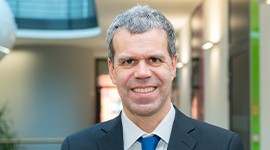Europe-wide project for the fight against West-Nile-Fever
On February 8th, 2011 the EU collaborative research project “West Nile Integrated Shield Project” (WINGS), which aims to develop innovative strategies for the control of West Nile Virus, started with a kick-off meeting at the Fraunhofer Institute for Cell Therapy and Immunology in Leipzig.
In 2010 a severe outbreak of West Nile Fever in Greece left 34 dead and hun-dreds of persons were seriously affected. An increasing number of cases over the last years is also reported from Russia, Israel, Turkey and other mediterra-nean countries. Furthermore, West Nile Virus was recently identified in birds in Austria and England. The Virus primarily infects birds but can be transmitted to humans and other mammals by mosquito bites. Usually influenza-like symp-toms are associated with this zoonotic infection, however, in some cases severe neurological complications are reported. Especially for older and immunocom-promised people the virus can be dangerous. Due to the occurrence of trans-mitting mosquito species an emergence of the virus in Germany and other parts of Europe can not be excluded.
To date there is no vaccine which can protect humans against a West Nile Virus infection. In addition, an accurate diagnosis is complicated by the fact that existing methods often show cross reactivity with related viruses.
The European Union reacts to the need for the development of effective con-trol measures by funding the collaborative research project “West Nile Inte-grated Shield Project” (WINGS) with three million euros. Dr. Sebastian Ulbert, coordinator and project manager at the Fraunhofer IZI, summarizes the goals of the project: “Our aim is to use novel and secure technologies for the devel-opment of an efficient vaccine and an improved detection system. These can be rapidly adjusted to emerging variants of the virus. Additionally we want to analyze the spread of West Nile Virus in Europe.” He will be coordinating the nine partner institutions from Europe and the USA to achieve these goals within the next three years.
On February 8, 2011, the project started with a kick-off meeting in Leipzig. All participating partners came together to discuss research strategies and work plans.
